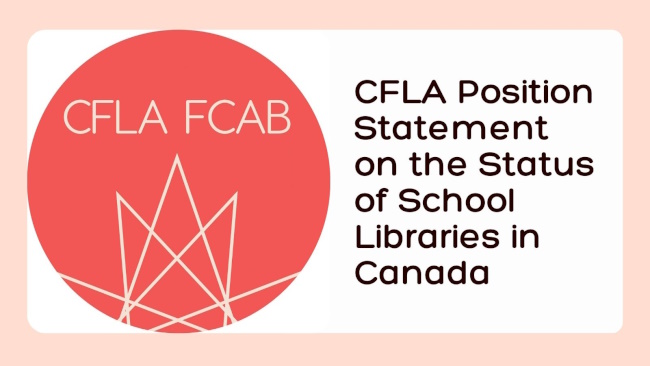
CFLA Releases Position Statement on the Status of School Libraries in Canada
May 9, 2024
CFLA Position Statement on the Status of School Libraries in Canada
The Canadian Federation of Library Associations (CFLA) believes that every child in Canada deserves access to an excellent, professionally staffed, and fully-funded school library. Our school libraries are an integral part of students’ educational experience and should reflect our common values of equity, diversity, and cultural identity as well as best approaches in the education and library professions. They should be contextually relevant to student needs and success. School libraries should be built, cared for, measured, renewed and sustained on an ongoing basis and integrated into school goals.
Thirty years of international research has established that school library programs with qualified professional staff have a significant positive impact on student academic achievement, especially in literacy development, reading engagement, information and digital media literacy, and research skills. School libraries also make a unique contribution to student well-being as inclusive and welcoming spaces, supporting the diverse needs of all students.
Canada’s public school systems are founded on the premise that all children deserve access to quality education, yet there are vast inequities between jurisdictions in the provision of library facilities, collections, programs, and services. Chronic underfunding has resulted in depleted and outdated collections, the de-professionalization of library staffing, and reduced hours of operation. In many schools and districts, libraries have been closed altogether.
Across the country there are widely divergent understandings of the role of the school library, and equally divergent or even non-existent policy frameworks, funding models, staffing, and program expectations. That Canadian students’ access to library programs and services depends largely on where they live is a deplorable situation in one of the world’s richest democracies. Equity of access to quality school library programs and services should be considered as a core foundation for education in Canada.
The Canadian Federation of Library Associations supports the establishment of:
- an open and accessible library learning commons in every school, including the protection of existing libraries;
- policy and funding frameworks to provide equitable access to school library facilities, collections, services, and programs designed to meet the diverse needs, abilities, and identities of all learners;
- policy and funding frameworks to ensure every school library is professionally staffed and appropriately funded, and able to provide relevant and current resources, technologies, and physical and virtual learning spaces to support the evolving needs of all learners;
- a policy framework that recognizes the importance of intellectual freedom in libraries, particularly in protecting and amplifying the voices of underrepresented identities.
We call for a national consensus on the role of school libraries in public education consistent with this vision.
The CFLA recognizes that all students have the same rights of inquiry and access to information as any library user, and these rights should not be impeded by political or ideological considerations.
Foundations for School Library Learning Commons in Canada: A Framework for Success (Canadian School Libraries, 2023) provides guidelines for building effective library learning commons programs, based on the International Federation of Library Association’s (IFLA) School Library Guidelines, 2nd revised edition (2015), internationally-approved standards for school libraries. The foundations and frameworks described in the document serve as a prerequisite for the successful implementation of Leading Learning: Standards of Practice for School Library Learning Commons in Canada (Canadian School Libraries). Leading Learning standards are expressions of the core actions that effective school library learning commons programs take to have an impact on student learning.
Add a new comment